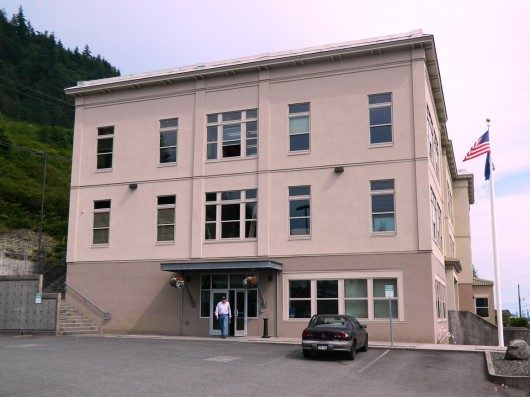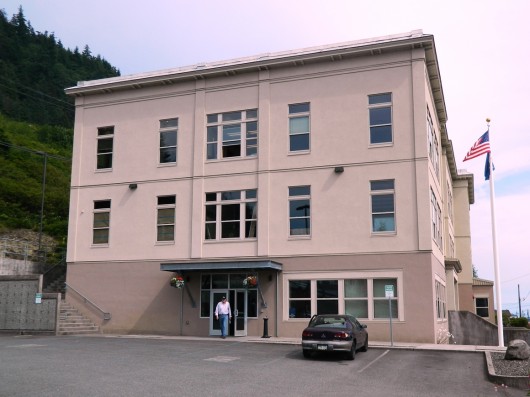The Ketchikan Gateway Borough Assembly on Monday unanimously agreed to postpone action on the agenda’s two big-ticket items: a proposal to sue the State of Alaska over its school funding formula; and whether to place a proposed new service area on the October ballot.
The Assembly discussed the potential lawsuit during a long executive session with attorney Robert Hicks, who researched the issue for the borough. When they emerged from the approximately two-hour closed-door session, Assembly Member Agnes Moran moved to delay action on the issue until the Assembly could meet with Borough Attorney Scott Brandt-Erichsen, who was absent Monday.
Before the executive session, Assembly Member Glen Thompson pushed to talk about the issue publicly. He gave two reasons. The first is that the public should be informed about an issue that could cost the borough upwards of a million dollars.
“Secondly, all of the pros with regard to this potential lawsuit are summed up in part A (of the agenda statement),” he said. “What we’re going to hear in executive session is likely the challenges and the cons of why we might not want to do this. I submit to this Assembly that the public should have a chance to weigh in on all the reasons why we shouldn’t spend between $600,000 and a million dollars.”
Thompson offered an amendment to waive attorney-client privilege and discuss the matter openly, but Mayor Dave Kiffer ruled that motion out of order, essentially because the amendment was the negative to the original motion.
Thompson then cast the only dissenting vote for the motion to enter into executive session. State law allows local elected bodies to talk privately about litigation or potential litigation.
For several years now, the borough has challenged the state’s school funding practice, claiming that current regulations are unfair to organized boroughs, and place undue burden on local governments. The borough has lobbied government officials and regional elected representatives.
According to information in the meeting packet, if the borough chooses to move forward with a lawsuit, “plaintiffs should be willing to employ every lawful strategy and to surrender no advantage to the formidable adversaries that plaintiffs would face.”
Borough Manager Dan Bockhorst writes that if the borough follows that strategy, it has a reasonable prospect for success.
Also Monday, the Assembly unanimously agreed to postpone the second reading of an ordinance placing the proposed Saxman-South Tongass service area on the October ballot.
The Assembly voted July 1 to approve the first reading of the measure, which would essentially add Saxman to the South Tongass fire and EMS service area, but keep the two area’s water services separate.
The South Tongass Service Area already provides fire and EMS to Saxman, but according to borough information, Saxman pays only for the EMS service.
The Saxman City Council has voted to support the new service area, but the Saxman IRA Council opposes it. Concerns have been raised over whether the new service area would affect Saxman’s federal rural designation.
Assistant Borough Manager Cynna Gubatayao said a public hearing is scheduled this week to provide information and gather more input.
“Hopefully we’ll have Saxman residents or City Council members there to participate,” she said. “They can’t vote, but of course their public input is always appreciated. And we wanted to take the time and discuss with the South Tongass Service Area Board that a 1-percent (sales) tax could potentially generate a substantial amount of income that could be used to offset the high property taxes out there, or other approaches.”
That meeting is 5:30 p.m. Thursday at the South Tongass Fire Department on Roosevelt Drive.
Also Monday, the Assembly heard from Ken Arriola, who said the Rainbird Trail above the Third Avenue Bypass needs maintenance. The trail is popular, especially during the summer months, when many tourists head up there for the view.
“I’m out in the woods a lot and I get into a lot of really rough terrain areas, and for me, that first part of the Rainbird Trail, the east end, it’s scary,” he said. “The footing is not very good, and the brush is coming into the trail, so I see a potential liability for somebody there.”
Arriola suggested that because visitors use the trail, perhaps the community could designate cruise passenger tax funds for the work. The Assembly directed borough staff to look into the potential cost of improving the trail.
The Assembly’s next regular meeting is Aug. 5.










